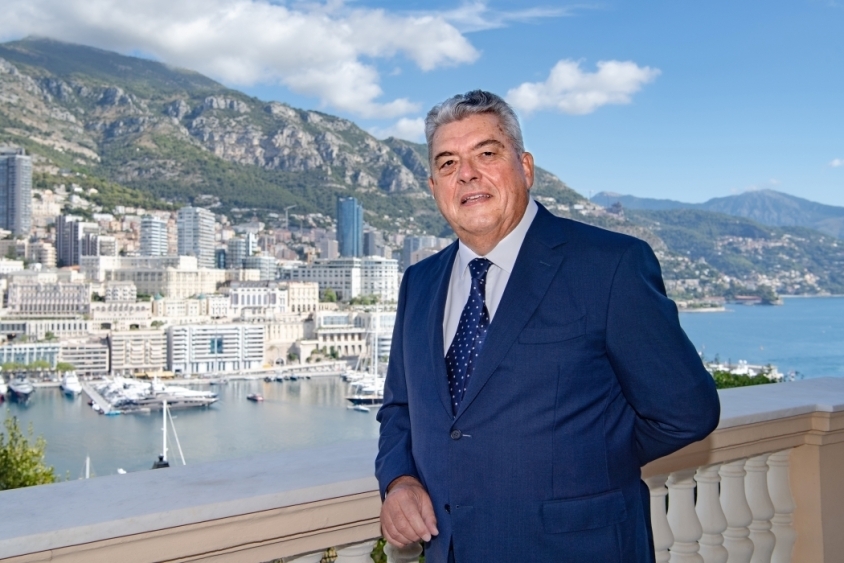
In an Exclusive Interview, Minister of State Pierre Dartout Talks Tax Treaties, Digital Economy and The Competitive Business of The Sovereign Cloud to Attract Investors to Monaco.
The call came out of the blue. At the time Pierre Dartout was prefect of Provence- Alpes-Côte d’Azur, having begun his career as a civil servant in 1980. “Before my nomination, I had often met Prince Albert but it was a surprise when I received a call from Monaco to offer me the position of minister of state. This was an honor for me and my family,” says Dartout, who took over as Ministre d'État from Serge Telle on September 1, 2020.
Having served the French state throughout his professional life, the ministerial nomination to Monaco was both an “accomplishment and challenge.” The 67-year-old is clear to point out that he does not set personal objectives. “I work for the prince, the Principality and the residents of the country. My duty is to organize the government to implement the policy decided by the Sovereign.”
Following the roadmap provided to him by Prince Albert, Dartout conducts the political program of the government under three main guidelines—sustainable development and halving gas emissions by 2030 through mobility, waste treatment and buildings’ energy use initiatives; security, including the fields of digital and health; and recovery in the social, economic and cultural sectors following the Covid pandemic.
Dartout arrived smack in the middle of the Covid crisis with several sanitary and economic measures already in place. “I was impressed by the management of the crisis. People respected the measures. Restaurants, bars and cultural life were ongoing...It was tailor-made management as only Monaco can do.”
A large economic recovery plan was soon after implemented under his direction and to date, the government has spent €80.8 million to support businesses and protect jobs. “When you add up all the measures taken for job protection and the economy, and to buy medical equipment, such as masks and vaccines, the Monegasque state has allocated more than €400 million—that is one- quarter of its annual budget.”
The Limougeaude (he shares his birthplace with Renoir) remarks that the government monitors the evolution of the virus on a daily basis, analyzing its impact on Princess Grace Hospital Center and the economy, to be able to react as needed.
All things considered, it would seem Monaco fared well in 2021. For Dartout, “It was the year of recovery from lockdown. And one of the significant events was Formula One as Monaco was the first country in the world to maintain the Grand Prix race. We decided to open it to the public [with strict health protocol measures in place], sending an important message that the Principality had returned to the world event’s calendar. It was also the starting point for the tourist season, which was a success this summer—fewer tourists than before the crisis but they spent more, which enabled the state to keep public finances in balance.”
The digital economy in Monaco represents 5% of its GDP and the country’s post-Covid economic recovery includes a strong focus on digital. Not only to support the digital transformation for businesses through the Blue Fund, set up in January 2021 and backed by Extended Monaco with an initial endowment of €20 million, but to boost the country’s appeal to new investors. “Security is one of our greatest assets in terms of attractiveness,” explains Datrout, “and the implementation of the sovereign cloud is a defining moment.”
Since Covid hit the region in March 2019, the importance of digital technology in economic development has been proven. “This is an area where we have fallen behind, with an underdeveloped digital ecosystem in Monaco in terms of platforms. Monaco businesses lack digital maturity and, overall, our economy is focused on sectors that depend on physical flow, like real estate, tourism and so on.”
Dartout is adamant that Monaco’s priority is to quickly build an ecosystem that meets leading international standards, which will be achieved through the creation of high-performing infrastructure that will enable entrepreneurs to increase productivity. “First, there was the launch this year of the sovereign cloud which will allow data to be stored in the Principality, subject to Monegasque law and with a level of security validated and monitored by the Monaco Cyber Security Agency. Then in September we introduced electronic signatures and a stamp distributed by the Business Development Agency in accordance with the legislation on digital technology adopted in late 2019.”
Monaco's Chief Digital Officer Frédéric Genta told in March, “The government has invested more than €2 million in the cloud and is expecting revenues from both the public and private sectors.” He added, “The cloud is a very competitive business and it will be run as such to benefit from the growth of digital transition. We want to make Monaco future proof with the cloud as an act of economic and sovereign synergy.” The cloud’s security standards are based on Amazon Web Services (AWS)— technology owned by Amazon, a world market leader who invests billions in security—and a digital twin e-embassy, secure data hosting that fully guarantees immunity and privileges similar to those offered by a physical embassy, has been created in Luxembourg. The data centre provides extraterritorial hosting to meet the highest Tier 4 security standards and stores data for NATO and the European Union.
Token Talk
In line with the future of the country’s digital economy, Monaco’s Security Token Law, Bill No. 1491 was passed in June 2020. It provides the legal framework for cryptocurrency fundraising (ICO) by authorizing operations that meet certain environmental or societal criteria, through the launch of an STO (Security Token Offering) platform, proposed by Tokeny. “We are looking for mature companies who wish to raise funds between €5 million and €50 million. They have to be profitable or in the process of profitability.” Frédéric Genta is Monaco's chief digital officer.
“As you see,” says Dartout, “digital transition is an important part of our strategy to build the future of Monaco. More generally, one of my highest priorities in 2022 is to strengthen the policies of attractiveness which concerns all sectors—from health and housing to the environment and education.”
Along with the cloud, another achievement for the Principality this year has been its presence at the 2020 Dubai Expo, at which Monaco was honored with a National Day on November 13 in the presence of Prince Albert and Princess Stephanie. The prince commented, “International expos are, in general, a key platform for international exchanges and dialogue, as well as to provide various opportunities to move forward.”
Dartout, who accompanied Prince Albert and the entourage, had the opportunity to twice visit the “Rock of Monaco” inspired pavilion featuring photovoltaic panels. “I was astonished by its architecture and the technical innovations. Our teams in Dubai said the pavilion has been very successful with international visitors.”
Prince Albert has said he hopes Monaco’s participation at the 2020 Dubai Expo will lead to opportunities for cooperation between Monaco and the UAE, including in the areas of technology, sustainability, culture and sports.
Already a bilateral tax agreement was announced between the Principality and the UAE. Dartout highlights, “This agreement was signed on November 13, 2021. Its purpose is to eliminate double taxation in terms of income tax and the prevention of tax evasion and fraud. This type of agreement is important because it helps to develop economic relations between the Principality and other countries. At the instigation of Prince Albert, Monaco undertook, in 2009, to enter into agreements respecting, in terms of the exchange of information, the standards developed by the OECD.”
Monaco has tax treaties with 36 different countries, including the U.S., the U.K., India and Europe—with France, Germany, Italy, Austria, Sweden, Denmark, Belgium and the Netherlands. “Together, these countries represent a population of over 2 billion people,” Dartout states. If we can go further with other countries, we will do it.”
Traveling abroad, minister of state Dartout has seen the positive reaction that Monaco’s image evokes internationally. “Anywhere in the world, when you mention the Principality, Monaco or Monte Carlo, it is labeled a modern and secure country. And it is important to enforce this reputation.”
Dartout points out that he does not “represent” Monaco. “The Constitution stipulates that the representative of Monaco to foreign powers is the Sovereign Prince. Sometimes I help His Serene Highness to represent Monaco with the French authorities or administration. I try to make the cooperation between our two countries easier but I don’t represent Monaco.”
Arriving in Monaco a little over a year ago to start his new position as minister of state, Dartout says he discovered an efficient administration. “There is a real pride in working in the service of one’s country. I was also struck by the desire to work on the attractiveness of Monaco. While maintaining the fundamentals, such as business tourism or the luxury industry, there is Extended Monaco which aims to prepare the digital economy of the future. It is an ambitious and very important program involving hundreds of people.”
Over the last fifteen months, and despite the pandemic, the minister has discovered a diverse Monaco, a country that is engaged in local and international topics. “I think it is important to listen to Monegasques and residents. I spend a lot of time meeting people, consulting sectors and studying problems to offer the best possible answers to the Sovereign.”
Pierre Dartout reflects. “Just before becoming minister of state, I said to myself: ‘I know Monaco, now I have to discover the Monegasques.’”

